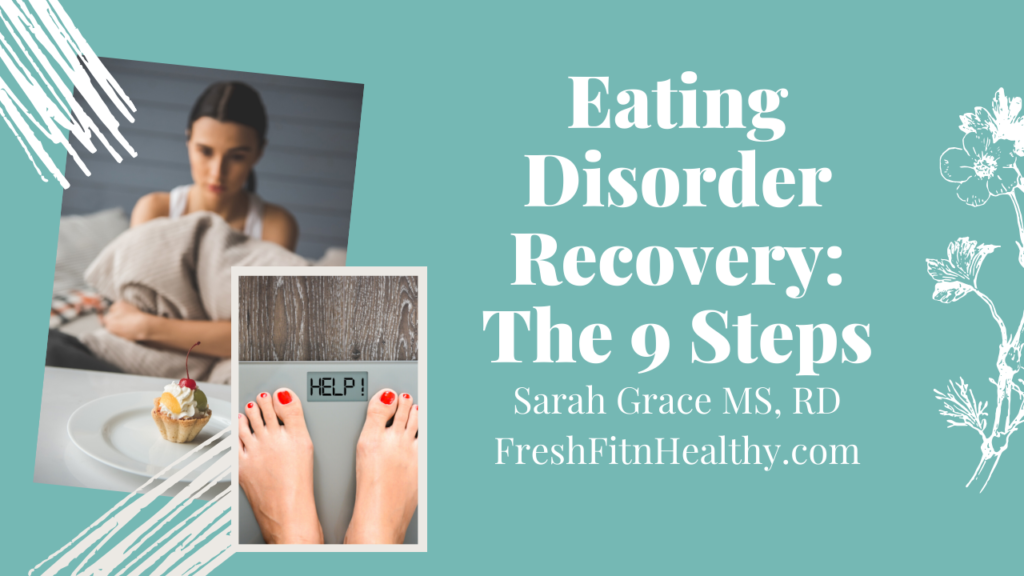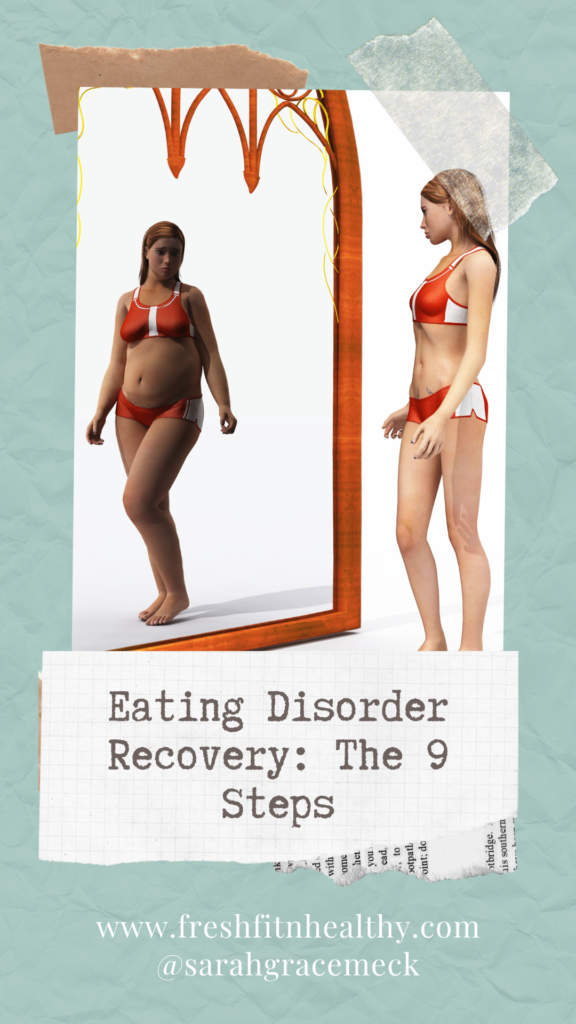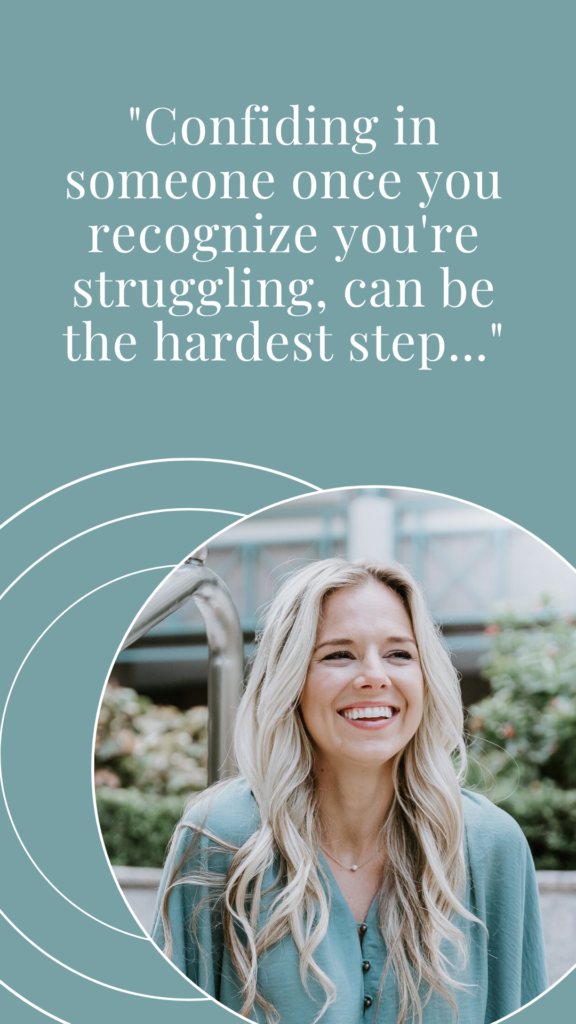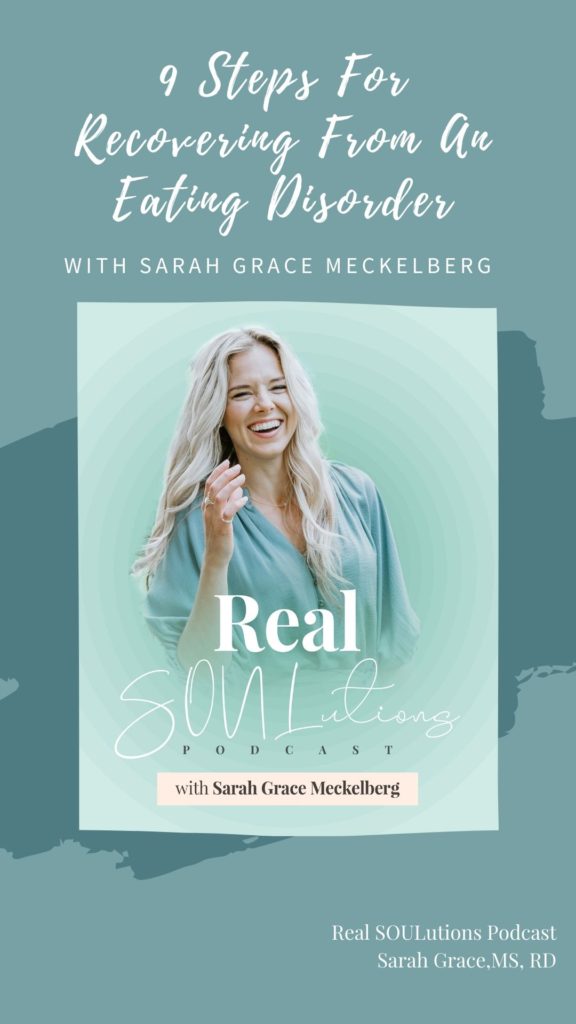The 9 Steps To Eating Disorder Recovery to finally discover the freedom you are meant to live in

Eating Disorder Recovery
In honor of National Eating Disorders Awareness Week I wanted to focus on eating disorder recovery today. This subject is very near and dear to my heart because I struggled with anorexia in high school. It took me years and years to recover and find complete freedom. Now as a dietitian and someone who has struggled with this in the past I want to bring awareness and help anyone who is struggling whether its with anorexia, bulimia, or any other eating disorder. Whether this post is perfect for you or for someone you know, I want you to know that you can recover and find peace and total freedom.
A lot of times anorexia and bulimia aren’t about the actual food; they’re about using food to cope with painful emotions such as anger, self-hate, and fear. Disordered eating is a coping mechanism. Whether you refuse food to feel in control, you binge for comfort, or you purge to punish yourself. Personally, my story of anorexia was all about a need for control. Because so many things in my life were out of control I figured I would control the one thing I could: my food intake. True recovery from any kind of eating disorder comes from learning to listen to your body, and feelings. Learning to trust and accept yourself, and to enjoy life again. I want to cover the 9 steps or things you or a loved one can do if you’re struggling with an eating disorder.
Listen to the Podcast on iTunes right here
Listen to the Podcast on Spotify here
Or read it below!
The 9 Steps to Eating Disorder Recovery

Step 1: Recognizing You Have A Problem
This was the hardest step for me to be honest. It’s so easy to make excuses and not accept that you have a problem.
Questions to ask yourself:
- When did you begin having different thoughts about food and what were the thoughts?
- What was the different behavior and what did you hope to accomplish in terms of using that behavior? Such as weight loss, gain of control, someones attention.
- Have you noticed any physical health symptoms such as fatigue, loss of hair, digestive problems, loss of menstrual cycle, heart palpitations, or others?
- Do you see any emotional affects?
- How are you currently feeling physically and emotionally?
- Do you feel ready to stop the disordered eating behaviors? Do you truly want change?
- How can the people in your life best support you?
- Do you want them to monitor your behavior?
- Do you want them to ask you how you’re doing with your recovery or would you rather just let them know?
Step 2: Admitting You Have A Problem To Someone Else
This is step is even harder. Personally I was the independent girl who was always helping others, I didn’t want to be seen as the weak one. It’s so important to admit you need help and to confide in someone so they can be there for you.

Step 3: Find A Specialist in Eating Disorder Recovery
Find an eating disorder specialist, or a dietitian who specializes in eating disorders. Someone who specializes in this area will be able to help and understand you most.
Step 4: Address Your Current Health Problems
This is something you’ll do with your specialist! Some health problems which steam from eating disorders are things like electrolyte balances, which can interfere with the functioning of your heart, muscles, and nerves. Any heart problems, digestive problems, nutrient deficiencies, or dental cavities/erosion of the surface of your teeth form vomiting if you struggle with bulimia. Low bone density, osteoporosis, stunted growth, and mental health condition such as OCD, depression, anxiety. Loss of mensuration, and problems with fertility. These are all things you want to be able to address with your specialist and start to find solutions for.
Step 5: Spend Quiet Time Journaling
If you have faith like me talk to God. This was a huge part of my recovery journey. I really had to seek out God, and what he says about me and my life because there was so many lies going into my head about food, my body, and my future. I had to constantly fight out the lies with Gods truth. I also had to find a deeper why for choosing recovery than just “I want people to stop looking at me like I’m weak”. My why for wanting to recover fully ended up being “God says my body is a temple of the Holy Spirit, it’s not my own and I should honor it” I realized I was not honoring my body at all. God offers all of us total freedom and my complete freedom came from only him.
Whether or not you have the same faith as me I want you to know that spending time journaling your thoughts and emotions and finding hat deeper why is so so important. When it comes to this side of journaling and this side of finding your why here are some do’s and don’ts.
- Do allow yourself to be vulnerable with people you trust
- Do fully experience every emotion
- Do be open and accepting of all your emotions
- Do use people to comfort you when you’re feeling bad instead of comforting yourself with food
- Do let your emotions comes and go as they please without fear
- Don’t pretend you dont feel anything when you do
- Don’t let people shame or humiliate you for having or expressing feelings
- Don’t avoid feelings because they made you feel uncomfortable
- Don’t worry about your feelings making you fall apart
- Don’t focus on food when you’re experiencing a painful emotion
Step 6: Make A Long Term Eating Disorder Recovery Treatment Plan With Your Specialist
You should have a full team behind you when you’re trying to recover. The last thing I want you to think is that you can do this on your own. Your unique plan should be individualized to you whether it’s nutrition counseling with a dietitian, going to an eating disorder support groups, or seeing doctors. Besides professionals, it’s so important to be surrounding yourself with people in person and on social media who make you feel good and motivate you towards eating normally and not restricting. If you feel yourself following people on social media or in person who are encouraging your eating disorder habits unfollow them or stop hanging out with them!! That is not mean of you, it’s whats healthiest for you.
Step 7: Work On Improving Yourself And Your Body Image
When you base your self worth on appearance alone you’re ignoring all the other qualities, accomplishments, and abilities that make you beautiful. Think about your friends and family members, do they love you for the way you look or for who you are? Chances are your appearance ranks low on the list for what they love about you and you probably feel the same way about them. So why is your appearance on the top of your own list?
Here are some tips to help improve your body image:
- Wear clothes you feel comfortable in
- Dress to impress yourself not to impress others
- Stay away from the scale
- Stay away from fashion magazines and people online who make you feel bad about yourself or promote unhealthy health standards.
- Do nice things for your body. Get a massage or a facial, pamper yourself with a girls night in. Enjoy a candle lit bath while you diffuse some relaxing essential oils.
- Stay active -I don’t mean go work out rigorously 5x a week. Move your body in a way you love and that makes you happy. Go on a walk outside with your dog or a friend.
Step 8: Learning And Establishing Healthy Eating Habits
Getting back to a regular eating schedule. You may be used to skipping meals or fasting for long stretches. When you starve yourself food becomes all you think about. To avoid this preoccupation make sure you eat every 3 hours and plan your meals and snacks so you don’t skip them. When you restrict and tell yourself no to a food you only think about it more.
Challenge your eating rules: when struggling with an eating disorder you create all these rules in your head. Such as “You’re good if you eat under this many calories” or “You’re bad for eating white bread”. Challenge your fear foods by incorporating them in a couple times a week to prove to yourself nothing bad happens when they’re eaten.
Focus on healthy eating, not dieting- this is the key for long-term health. Instead of focusing on things you shouldn’t eat, focus on nutritious foods which will energize you and make you strong. Think of food as fuel, just because something is high in calories or fat doesn’t make it bad for you. Is it nutritious? Is it dense with nutrients and minerals and fiber? Then it’s good for you. Remember your body knows when its tank is running low so listen to it! If you’re feeling hungry don’t say “I don’t deserve food yet” go ahead and eat and listen to your body. This is one of the last steps in recovery because you have to fuel your body correctly for a given amount of time before you can listen to it. If you’ve been starving yourself for a while your bodys hunger cues are off and your body wont tell you when its hungry.
Step 9: Maintain Your Progress
The work of an eating disorder recovery doesn’t end once you’ve gotten to a good place physically and mentally. Its super important to maintain your progress so you don’t relapse.
Here are some things to do to make sure you continue recovering and not retracting and going backwards.
- Develop a solid support system. Surround yourself with people who bring you up and encourage you to eat normally.
- Stick to your eating disorder recovery plan! Don’t miss any therapy appointments even if you feel like you are doing better! If you’ve been prescribed weight gain shakes, or eating a certain amount of times a day do not neglect that! Do not neglect the step you are given in your treatment plan.
- Fill your life with positive activities. The happier you are the less likely you are to replace. The times when I feel sad are when I am tempted to fall back into bad habits. Pick up a fun hobby, or a fun new exercise to incorporate into your week.
- Avoiding websites that promote or glorify anorexia or bulimia, obesity, anything unhealthy. You don’t want to focus on anything that promotes negative things in the health space.
- Identify your triggers. When are you more likely to revert back to destructive ways? Is it during the holidays when you’re home? Is it during exam week when you’re stressed? Or is it during swimsuit season when you feel a little bit insecure? Try and figure out what those triggers are for you and find a way to deal with them. Going to therapy more often and asking friends and family for support is huge. Having a person to tell “I know that this is a trigger for me so can you reach out to me and support me during this season” so that they can be there for you.

Let’s spread awareness of this topic! That is not something to be ashamed of or to hide and that you can find total freedom from this! If you share this on your story tag me on instagram at @SarahGraceMeck
If you have any questions please feel free to reach out to me at freshfitnhealthy@gmail.com